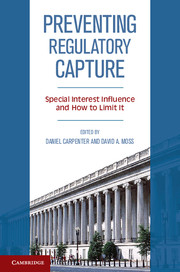Book contents
- Frontmatter
- Contents
- List of Figures
- List of Tables
- Editors
- Contributors
- Preface
- Acknowledgments
- Introduction
- Section I Failures of Capture Scholarship
- Section II New Conceptions of Capture – Mechanisms and Outcomes
- Section III Regulatory Case Studies
- Section IV The Possibility of Preventing Capture
- 13 Preventing Capture Through Consumer Empowerment Programs
- 14 Courts and Regulatory Capture
- 15 Can Executive Review Help Prevent Capture?
- Conclusion
- Afterword
- Index
- References
15 - Can Executive Review Help Prevent Capture?
Published online by Cambridge University Press: 05 June 2014
- Frontmatter
- Contents
- List of Figures
- List of Tables
- Editors
- Contributors
- Preface
- Acknowledgments
- Introduction
- Section I Failures of Capture Scholarship
- Section II New Conceptions of Capture – Mechanisms and Outcomes
- Section III Regulatory Case Studies
- Section IV The Possibility of Preventing Capture
- 13 Preventing Capture Through Consumer Empowerment Programs
- 14 Courts and Regulatory Capture
- 15 Can Executive Review Help Prevent Capture?
- Conclusion
- Afterword
- Index
- References
Summary
INTRODUCTION
Centralized review of federal regulations has become a core institution in the contemporary administrative state. Presidents of both political parties have embraced it, with relatively few changes since President Reagan put in place the basic architecture in 1981. Although the institution of centralized review continues to receive criticism from some quarters, there is broad consensus that it is likely to remain a persistent feature of the administrative state for the foreseeable future.
Since its inception, centralized review has been closely linked with theories of agency capture. Many of its most prominent defenders have grounded the legitimacy of regulatory review in fears that unchecked agencies will be systematically biased in the exercise of their powers, including by accommodating powerful special interests to the detriment of general social welfare. According to this line of thinking, centralized review facilitates presidential control over agencies, which helps to ensure that administrative action is responsive to the broad national constituency represented by the president rather than to parochial special interests.
There are two important problems with this account. First, the background assumption of the conventional account – that the president responds to a national, rather than parochial, constituency – is overly simplistic. Presidents respond to a range of incentives that may not be well aligned with the broad national interest. More important, the Office of Information and Regulatory Affairs (OIRA), which is charged with carrying out centralized review, is not the functional equivalent of the president. Even if increased presidential control is desirable, it is not obvious that OIRA review always achieves this goal.
- Type
- Chapter
- Information
- Preventing Regulatory CaptureSpecial Interest Influence and How to Limit it, pp. 420 - 450Publisher: Cambridge University PressPrint publication year: 2013
References
- 3
- Cited by

